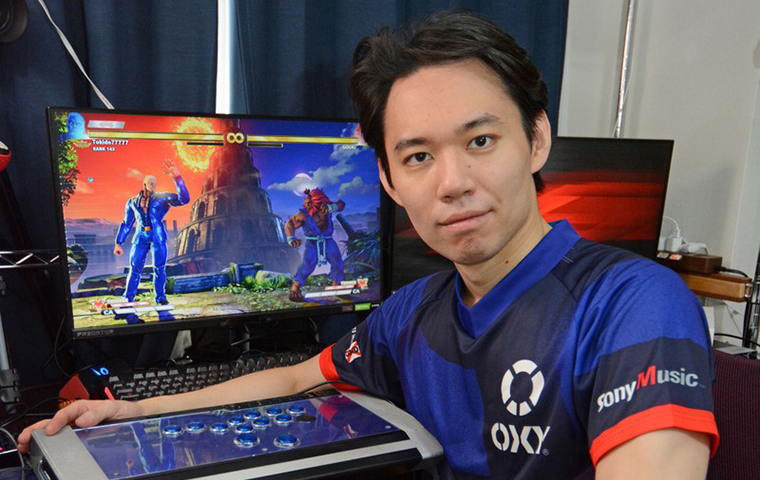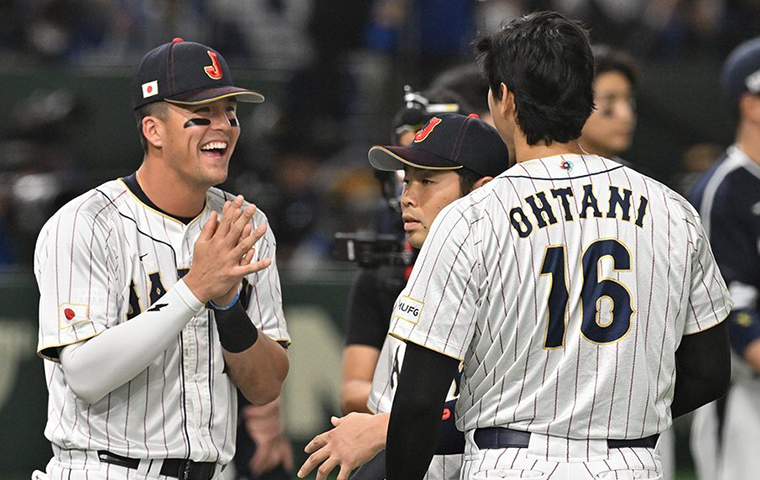Encouraged by Parents: Why a Graduate of Most Elite University Became Esports Pro
Related Articles

Interview with “Tokido,” University of Tokyo Graduate Fighting Games Professional
Despite graduating from the most prestigious University of Tokyo, he debuted as the second fighting game professional in Japan. He is now a world-renowned player, but his journey was a series of stumbles and doubts.
(Interviewed by Tatsuya Shiratori, Weekly Economist editorial desk)
“I’m passionately working on games.”
“Even today, becoming a professional gamer is a decision met with opposition. I never thought my parents would encourage me.”
– At the Intel World Open held in June-July 2021, you became the champion in the Japan & South Korea Regional Finals for the fighting game “Street Fighter V.”
Tokido: Intel World Open was originally an international event held ahead of the 2020 Tokyo Olympics. Qualifying tournaments are held in 11 regions in the world, and the champions from each region were supposed to gather for the world championship on the eve of the Olympic opening. But because of the COVID pandemic, it was changed to having finals within each region.
I lost in the final round once, but came back winning through the losers’ bracket, and in the finals, I competed with the player I previously lost against. I got my revenge and became the champion.

– What kind of equipment do you use at competitions?
Tokido: Before the COVID pandemic, we basically used video game consoles. But now, most of the events are held online, so it’s mainly gaming PCs.
The performance of each equipment drastically affects competitions. For example, monitors have response time, which is the time it takes to respond to the controller operation and depict it on the screen. The quicker this is, you can instantly respond to the opponent’s move. So I thoroughly pursue each part without compromise to win.
– That’s not forbidden by the rules.
Tokido: There are certain regulations, but you are free to make customizations within the rules. I also customize my controller by changing its size and the location of specific buttons so I could press them with my palm from an ergonomic standpoint.
An Enthralling “Defeat”
– There are various genres of games. Why did you choose fighting games?
Tokido: When I was a third grader in elementary school, I played against my cousin in a game called “Virtua Fighter” by Sega and got completely beaten. Until then, whether it was studies or games, I always did better than others, and hardly ever experienced a loss. I was enthralled by the fact that there were people out there you need to put in efforts to win.
From then on, I played nothing but fighting games. I spent all my time at home doing fighting games. As for my parents, they were like, “If you got good grades, we’ll buy you a video game,” so I studied really hard so they would buy me games. As a result, I was able to enter Azabu Junior High School, a prestigious private school in Tokyo.
His days immersed in video games continued after entering junior high school. After classes were over at 3:00 p.m., he would return to his hometown, Yokohama, and hang out at video arcades until 6:00 p.m., after which minors were restricted entry.
He played by what was left of his 500 yen lunch money given every day. He would get a cheap lunch, go to the video arcade, compete with his buddies, play the same game at home, and train on his own. It was during this period that he came up with the nickname “Tokido,” an acronym that combined the tactics of a game character he was using then.
Fails to Enter the University of Tokyo
– You didn’t need an exam to enter Azabu High School, but for university, that wasn’t the case.
Tokido: As you would expect, my parents got concerned, so I began attending a cram school from my first year in high school. I studied during my commute as well, so I think I studied at least eight hours a day.
Other than that, I just played games. In my second year of high school, I participated in “EVO 2002” held in the U.S., and although it was my first overseas tournament, I became the world champion. I was completely up in the air.
But life isn’t that easy. I began concentrating on my studies in my third year, but my grades didn’t improve much, and what’s more, I fell ill from the pressure for the entrance exam. In this situation, I took the entrance exam for the University of Tokyo but did not pass.
– Didn’t you think about going to other universities?
Tokido: Since my childhood, I never thought of anything else but going to the University of Tokyo. Partly, I was influenced by my father (Hisashi Taniguchi, Professor Emeritus of Tokyo Medical and Dental University).
His dream was to be a rock musician, but realizing he didn’t have enough talent to make a living out of it, he decided he wanted to study sound and tried to enter the University of Tokyo. When he failed the exam, he reconsidered and decided instead to make money, and continue doing music as a recreation, and aimed to become a dentist, known as a lucrative profession.
Since when I was small, my father had been telling me about the University of Tokyo. It’s not like he entrusted his dreams to me; rather, he talked about it as his own yearning.
As a child, I also developed an awareness my father would be pleased if I was admitted to the University of Tokyo, so I never thought of going anywhere else. I certainly questioned myself when I failed the exam, but I decided I would wait another year and aim for admission.
– Did you concentrate on studying for the entrance exam that year?
Tokido: I started attending a prep-school immediately after my failed exam, and my grades rapidly improved. By that summer, I was getting A-evaluations (over 80% possibility of passing) in mock exams. From then on, I spent my days studying until 7:00 p.m. at the prep-school, then staying at the video arcade until 11:00 p.m.
During that time, I discovered entrance exams and fighting games have things in common. To win in a fighting game, you review your opponent’s past matches and do a repetitive drill on the countermeasures. It’s the same for the University of Tokyo’s entrance exam that has traditionally set formats for the questions.
Once I was done with the basics, I focused on working on the past exams, and this resulted in being admitted to the Natural Sciences I of the University of Tokyo. Even with games, if you work on it seriously, you can pick up formulas that can apply to other things.
So Tokido finally entered the University of Tokyo. From this time on, he travelled abroad more often for tournaments, and his name came to be known around the world. Meanwhile, in his senior year, he became fascinated with his research field that he did not play any games for a whole year.
However, so absorbed in his research, he neglected to prepare for the graduate school exam and failed to enter the lab of his choice. Then he planned to get a job for a stable living. As he was considering becoming a civil servant, he reaches a turning point in his life.
– Just as you were planning a career, another option of becoming a professional gamer emerges.
Tokido: The most prominent player in the world of fighting games, Daigo Umehara, announced signing a sponsorship with a U.S. company to become a professional gamer. With this news, my mind was really torn between two paths. A civil servant or a professional gamer—which should I choose? I consulted lots of people, and there were two that gave me the push I needed.
“You’re Not That Type”
– Who were the two people?
Tokido: One was Umehara, I previously mentioned. Although he said, “If I had graduated the University of Tokyo, I wouldn’t have chosen to become a professional gamer,” he also said, “But it’s not a bad thing to challenge what you really love,” and showed his understanding for such a way of life.
The other was my father. His answer was clear and simple: “A person like you is not the type for a civil servant. You should do what you want to do.” Even these days, parents would oppose to the idea of their children becoming professional gamers. Even more so at that time when the industry scale was small.
I never thought my parents would encourage me like that. This was the decisive factor. I really felt he knew about me more than I did.
– By coincidence, you got an offer for a professional contract then.
Tokido: The Traveling Circus, a U.S. apparel company, offered me a sponsorship contract. Although I’ve decided to be a professional gamer, one sponsor isn’t enough to make a stable living.
So, to find other companies, I was going headlong, sending sponsor request e-mails to like every company abroad. My efforts were worthwhile, and I now have Rohto Pharmaceutical (Rohto G, OXY) and Sony Music Entertainment as my sponsors.

– By the way, can people make a living as professional gamers?
Tokido: There are various levels of professional gamers. You can’t get along just with the prize money from tournaments. For me, my primary income comes from the sponsors. I earn far more than the average income, so I don’t have any problem making a living.
– Esports is becoming something like baseball that comes naturally into view.
Tokido: I believe it will be so in the future. Yet, when we look at fighting games, it seems we don’t have enough talents. There are several serious game players who can say what they are doing can contribute to the entire society, but that’s not enough.
At least, if all the professional gamers can speak out with confidence, then parents could let their children play games and feel at peace. However, we’re not there yet. So pro gamers like us need to put in more effort.
– What kind of professional gamer do you want to become?
Tokido: I want to show how seriously I play to the people who think games are bad and change their views. I want to let people know that I’m making a living by passionately working on what I love—because for professional gamers, it all comes down to having an audience.
Hajime “Tokido” Taniguchi
Born in Okinawa in 1985. Graduated Azabu Senior High School and Faculty of Engineering of the University of Tokyo, left Department of Materials Engineering, School of Engineering of the University of Tokyo Graduate School mid-way. Signed sponsorship contract with U.S. apparel manufacturer, The Traveling Circus, and became the second professional gamer in Japan. Achievements at tournaments include the Evolution Championship 2017 champion and the Canada Cup 2019 champion. Author of Japanese books, “University of Tokyo Graduate Professional Gamer: Passion Beats Logic” (PHP Shinsho) and “Effort 2.0 by the World’s No. 1 Professional Gamer” (Diamond, Inc.)




